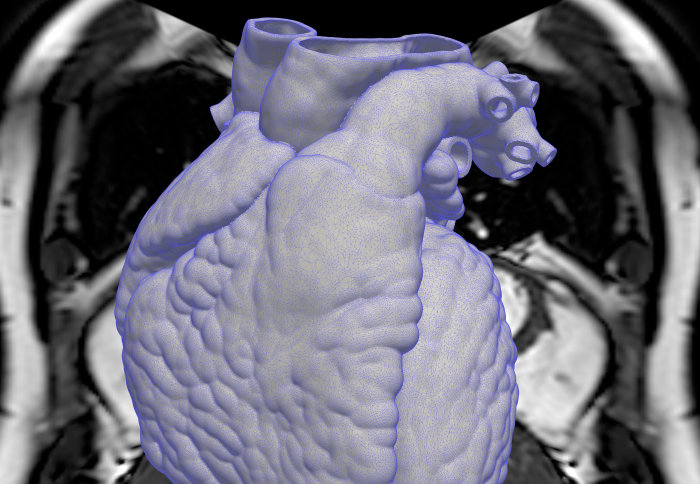Imperial and Bayer to accelerate drug discovery for heart conditions using AI
by Ryan O'Hare

Combining heart scans, health data and machine learning to unlock new treatments
A new industrial partnership will use artificial intelligence (AI) to speed up drug discovery.
Researchers at Imperial are partnering with Bayer Pharmaceuticals to explore how AI can accelerate the discovery of new drugs for heart conditions.
An estimated seven million people are living with heart and circulatory disease in the UK alone, with cardiovascular diseases responsible for one in four deaths. Identifying and treating patients at an early stage remains a challenge.
As part of the new collaboration, researchers will draw on data from UK Biobank, a national health resource containing a wealth of information on 500,000 people in the UK. The data available will enable researchers to discover pathways involved in heart disease that could provide new targets for treatment.
AI has the potential to transform our understanding of heart disease and accelerate the discovery of new treatments Dr Declan O’Regan Imperial College London
The multi-faculty team will be led by Dr Declan O’Regan from the MRC London Institute of Medical Sciences and Imperial’s Institute of Clinical Sciences, Professor Daniel Rueckert, from the Department of Computing, and Professor Martin Wilkins, from the Department of Medicine.
They will work with Bayer to develop machine learning tools to analyse imaging of the heart in 3D, along with genetic information, as part of a transformative approach to drug discovery.
The development of the collaboration has been supported by the Faculty of Medicine Corporate Partnerships team.
Harnessing machine learning
Previous work from Dr O’Regan has developed machine learning algorithms to build 3D models of the heart from cardiac magnetic resonance imaging (MRI), integrating other clinical data to predict the risk of developing heart failure and determine the impact of genetic factors.
This academic-industrial partnership...reflects Imperial’s dedication in advancing real-world applications of artificial intelligence in medical research Dr Declan O'Regan Imperial College London
The latest collaboration will build on this work, using machine learning to analyse MRI with genetic and health data to identify key pathways that could be potential drug targets. As part of the three-year project, Bayer will fund a cross-disciplinary scientist, working across the domains of genetics, clinical imaging and AI. The hope is that the partnership will accelerate drug discovery and lead to new ways to treat or prevent serious heart conditions.
Dr Declan O’Regan, said: “AI has the potential to transform our understanding of heart disease and accelerate the discovery of new treatments. Our collaboration with Bayer will harness state-of-the-art computer vision algorithms and advanced statistical techniques to understand the relationship between genetic variants and cardiac motion using data collected by UK Biobank.
"This academic-industrial partnership is made possible by innovative inter-disciplinary research that bridges the domains of imaging, machine learning and clinical pharmacology, and reflects Imperial’s dedication in advancing real-world applications of artificial intelligence in medical research.”
Daniel Freitag, Head of Cardiovascular Data Sciences at Bayer, said: “Through our collaboration with Imperial College London we hope to get a more holistic view of the elements leading to heart failure. Ultimately, this should help us get a better understanding of the molecular pathways involved in cardiac function, and thereby guide approaches to develop new therapies in this area.”
Article text (excluding photos or graphics) © Imperial College London.
Photos and graphics subject to third party copyright used with permission or © Imperial College London.
Reporter
Ryan O'Hare
Communications Division